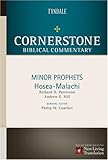
This is another commentary contained within Volume 10 of the Cornerstone Biblical Commentary series, which I am gradually working my way through. For more thoughts on the layout of the series, see my review of Andrew Hill on Micah.
Introduction
We know very little about Habakkuk. Patterson assumes a pre-exilic date, most likely during the reigns of either Josiah or Manasseh. The central theme of the book is faith, and we see how, despite how Habakkuk felt about the injustice he saw, he brought his doubts and perplexities to God in prayer and came to a place of trust.
Commentary
The “notes” sections serve as a way of highlighting exegetical issues, particularly the meaning of individual key words. Patterson feels free to disagree with the NLT translation. The “commentary” on each section always moves from summarising the meaning of the passage to drawing out a significant theological theme and discussing it in the light of other related Biblical passages.
A good example would be how he handles Hab 2:4, where he first explores the meaning of the verse in Habakkuk, explaining faithfulness as having both an active (truthfulness) and a passive (trustworthiness) sense. He then goes on to show how the different ways in which it is used in the New Testament (Rom 1:17 and Heb 10:35-39), as well as pointing out the way it references Gen 15:6.
because the believer is one in whom God’s righteous character has been reproduced, he can be expected to conduct himself in a manner consistent with his renewed being. … a genuinely righteous person will live out the faith in faithful activity
Patterson also highlights the different names that Habakkuk uses for God throughout the book, and how they mirror his journey from doubt to a confident faith that meant he could trust in the Lord through the coming hour of judgment and rejoice no matter what may happen.
Conclusion
These CBC commentaries serve as good companions to a Bible study, allowing you to get a good understanding of the meaning of the text as well as seeing how they fit into a wider theological picture. They help you to break out of the trap of just focusing on the famous verses, and getting a better grasp of the message of the whole book. Whilst the exegetical notes aren’t exhaustive, they are fairly thorough, meaning that you would only need to go for a more technical commentary if you were doing more in-depth study on the book.

